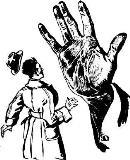
The Articles of Confederation acted as a “federal constitution” for the original thirteen American states, but it had no enforcing power.
The story of the fight over the US Constitution begins after the War for Independence. At that time, the state governments ignored the Articles of Confederation. In fact, they refused to cooperate on much of anything. Chaos crept in and threatened a total breakup of the union. So the states called for a Constitutional Convention to rewrite the Articles.
The states sent delegates to this convention. There, the majority decided to completely scrap the Articles. Instead, they wrote a whole new constitution. Of the fifty-five convention delegates, only thirty-eight, barely two thirds, signed the new constitution. The signers became known as the Federalists. That group included:
- George Washington, president of the convention. He was also America’s savior, because he won an impossible war;
- Benjamin Franklin, a master foreign negotiator as well as a world renowned scientist and sage;
- James Madison, who is called the Father of the Constitution because he played a much bigger role than anyone in the final document. He also wrote many of the Federalist Papers;
- Alexander Hamilton, who wrote most of the Federalist Papers. Those papers are the best description in existence of the Federalists’ intentions for the US Constitution.
Two other very important founders were not in the convention. John Adams and Thomas Jefferson were in England and France, respectively, as U.S. Ambassadors.
Nearly a third of the convention delegates refused to sign the new constitution.
Some walked out early in disgust while some stayed to fight the Federalists. Those who opposed the new constitution became known as the Anti-Federalists, and included:
- Patrick Henry, who back in 1776 made a speech that convinced many to join the revolution. It ended with “I know not what course others may take; but as for me, give me liberty, or give me death!”
- George Mason, the namesake of George Mason University, and principal author of the Virginia Declaration of Rights. That document provided many of the concepts Jefferson used in the Declaration of Independence.
- Richard Henry Lee, who officially presented the motion to declare independence from Britain, and was later a U.S. senator and president pro tempore of the Senate. He also happened to be a great-uncle of the Confederate General Robert E. Lee.
- James Monroe, later the fourth U.S. President. He also helped negotiate the Louisiana Purchase, and served as Secretary of War and Secretary of State.
- John Hancock, president of the U.S. Continental Congress at the time of the Declaration of Independence. He is remembered today for his huge defiant signature on the Declaration.
- Samuel Adams, one of the ‘Sons of Liberty’, instigators of the Boston Tea Party event. He was also incidentally a first cousin to later President John Adams.
- Elbridge Gerry, who signed both the Declaration of Independence and the Articles of Confederation, and later served as U.S. Vice President.
- George Clinton, who was a brigadier general in the Continental Army. He also served as Governor of New York and as U.S. Vice President under two presidents.
The fight over the US Constitution was about the division of power in the new nation.
The Federalists wanted the national government to be run by a “natural aristocracy”. That means the “better” or more sophisticated and educated men of the nation. The Anti-Federalists, on the other hand, wanted the national government to be more under the control of everyday people. Also, the Federalists wanted a strong national government, whereas the Anti-Federalists wanted strong state governments.
This fight over the US Constitution continued into the separate state conventions for ratifying that document. It even laid the groundwork for the first political parties.
Given the stature of these Anti-Federalists, do you think they may have had good reasons for refusing to sign the new constitution? Do you think America is run by a “natural aristocracy” or rather by everyday people through voting? Do you think the national government has too much, too little, or just the right amount of power, relative to the states?
You can add a comment at the bottom of the page about how to improve modern political systems. I will delete all non-relevant comments. I will also strip all URL links from comments, until WordPress fixes their hacking problem.


Your article helped me a lot. what do you think?
I’d be happy to link to your website and have yours link to mine. Do you have an English-language version of your site? If not, what language is your site written in? I would need to provide that information to my readers.
hi guysmy contry is in the rong hands , it is because CEO OF the companys a still have separation between black and white in working place , can the EFF change all this . the people a losing jobs this is very impontant look at this matter please thanks
All countries are in the wrong hands, because the right kind of leaders rarely want any part of government. The incentives are all wrong. My book addresses that and many related issues at a much deeper level than my blog. I’m working on getting an agent and publisher for the book, and will post related information when the book is available.
I am really impressed along with your writing skills as neatly
as with the layout for your weblog. Is this a paid topic or did you customize
it yourself? Anyway keep up the excellent high quality writing, it is rare to
look a nice weblog like this one nowadays.
Good shout
Greetings! Extremely gainful recommendation within this article! It’s the scarcely changes which liking turn the largest changes. Thanks a a quantity towards sharing!